My daughter was bitten by an XL bully. I met an owner to ask why they'd have one
 BBC
BBCA year ago, seven-year-old Lydia was walking to post a letter with her dad when she was savagely attacked by an XL bully that had escaped from a neighbour's garden.
Matt says the day turned to horror in an instant, telling us he first saw the escaped dog out of the corner of his eye and within seconds it was "attached" to his daughter's arm, biting her three or four times. He says the dog kept lunging for Lydia and in a frantic effort to stop it mauling his daughter, he had to "lie on top of it".
"It was remarkably strong," says Matt. He remembers Lydia's screams and seeing blood coming from her wounds, not knowing if her life was in danger.
Lydia ended up in hospital but her dad says it could have been much worse: "I could be dealing with the fact that she's not with me and she's been killed. That kept me awake at night."
He says the weeks immediately after the attack were tough for the family. Lydia would scream every time her bandages needed to be changed and on one occasion she jumped into Matt's arms when a dog approached them in the park.
Lydia says she thinks dogs should be on a lead and is clearly still wary of them: "I still like little dogs but I don't like the dogs that look like the one that bit me."
The incident left Matt with one question: Why would anyone want to own one of these dogs? He contacted Your Voice Your BBC News - and we took him to meet an XL bully owner to see if he could get some answers.
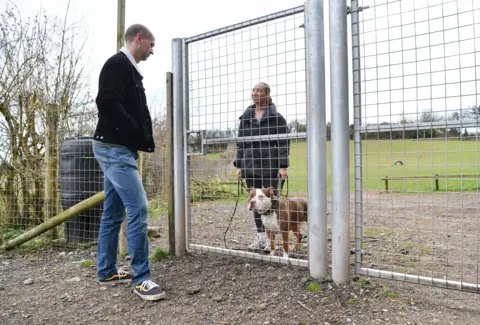
Matt is meeting Lily Collins, 25, who lives in Redditch with her partner Hayden and their two-year-old XL bully, Doug, at a secure dog field near their home.
It's a bright and cool spring morning and before Matt arrives, Lily takes Doug for a charge around. She throws a ball for him, which he enthusiastically retrieves, and the dog practises some of his training drills. Lily says she wants to show another side of XLs, which she thinks often gets overlooked.
When he gets out of the car, Matt is nervous and noticeably quiet. We've arranged for him to first greet Lily and Doug while they are on the other side of the high metal fence which surrounds the field.
Throughout our chat outside the gate, Doug sits at Lily's feet, wagging his tail, apparently happy to be getting so much attention.
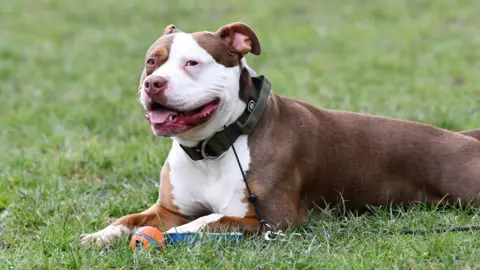
After a brief conversation through the chain link fence, Matt says he'd be happy to continue the conversation in the field, provided Doug is muzzled and under Lily's partner Hayden's control at a distance. He says, even though he feels Doug is well-trained, he can't stop thinking about what happened to Lydia.
As we open the gate, Matt visibly gulps. "I don't find myself uncomfortable like this very often," he says, adding that he feels awful to ask Lily to keep her pet away from him. "I feel sad that there's this thing almost automatically between us because of the type of dog it is."
Lily, however, says she is used to people acting apprehensively around Doug but tells us she firmly believes that a dog's behaviour is determined by how it is brought up and trained.
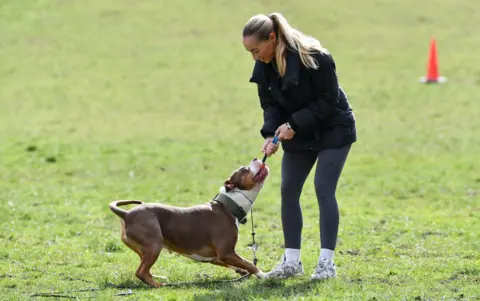
Since February last year, it has been illegal to own an XL bully in England and Wales without an exemption certificate.
The ban means there are now five banned types of dog in Britain - pit bull terrier, Japanese Tosa, Dogo Argentino and Fila Brasileiro, as well as XL bully. Dogs registered before the ban must be neutered, muzzled in public, and kept in secure conditions.
Lily says she got Doug before the ban was introduced and that she has invested significant time into training her family pet.
The dog was rescued from a backyard breeder and Lily tells us, if she and Hayden hadn't taken him in, there was a danger he'd have ended up in the wrong hands. "He'd either be dead or he would be like one of the dogs you probably see on the news," she says.
She describes what happened to Matt's daughter as heartbreaking. "How has that dog just escaped the house?" she asks. "It boils my blood."
Lily says she is confident Doug would never hurt anyone - but Matt wants to know if she can see the potential for harm that an XL bully dog has. "I look at him and think 'yeah, he could rip my throat out'," he says. "I want to be balanced and fair about it but it's hard not to look at his physique and think 'good grief'."
Lily says she often hears this reaction, but maintains it's a question of how the dog has been raised by its owners.
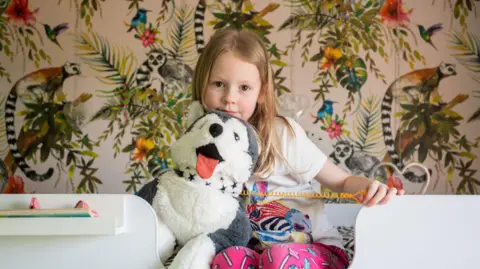
The attack on Lydia was not life-threatening but it left permanent scars. The dog was destroyed on the same day and, in November, its owner was given a 26-week suspended prison sentence, a 12-month community order and disqualified from keeping dogs for five years.
"These dogs are so powerful, they're so big and if you push them to their fullest capacity to be this big monster then it can happen," Lily says. "But I believe it's how you bring them up, how you treat them.
"These dogs need so much mental stimulation, they are not easy dogs to own. They are hard work."
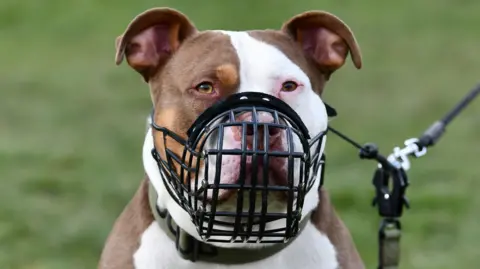
Matt says he can understand why Lily has taken Doug in - to rescue him from a different life - but he is still left with the same question: "Why would someone go after that breed of dog? Because all I can see is that it's about power and intimidation."
Despite the ban, XL bully attacks - including by pets on children in their own homes - have continued to make headlines. Following one recent incident, which resulted in the death of an 84-year-old man, police compared owning an XL bully to "like owning a loaded firearm with a questionable safety catch".
Nevertheless, Lily insists they can make "great family pets", adding: "[Doug's] not a status thing for us, he's not a weapon. We just love him so much."
Before the XL bully ban was introduced, the government estimated there were about 10,000 XL Bullies in the country.
That proved to be a significant underestimate, as there are now more than 57,000 XLs registered with the Department for Environment, Food and Rural Affairs. The RSPCA says there could be as many as 100,000 XLs in Britain, including many that have not been registered.

Matt would like licences to be mandatory for all big dogs that can cause harm - and to be conditional on owners showing they have done the correct training.
"Banning the breed doesn't seem to have changed much," says Matt. "But if you have to have a licence to own the dog, that feels like a more rigorous way of stopping the people who lead to attacks."
Lily says she completely agrees and adds that the law should go even further, requiring licensing for all 13 million dogs in the country.
She admits her dog could cause more damage than a smaller dog, but says they also fight and attack people.
Today, the RSPCA has renewed its calls for dog licensing schemes to be introduced across the UK, saying it believes such a move would help to tackle the challenges with dog ownership and allow better enforcement around dangerous dogs.
The BBC understands the government currently has no plans to bring in dog licensing and, in a statement, a spokesperson insisted that current laws were all about keeping people safe.
There are others who do think the Dangerous Dogs Act and XL bully ban are having an impact. Professor Vivien Lees, from the Royal College of Surgeons, told us that even though she and other surgeons were treating similar numbers of patients, they were seeing fewer of the most extreme injuries than they were the previous year.
Data from freedom of information requests to NHS England suggests surgeons are on course to treat as many under-10s for dog bite injuries this year as they did in 2023-24, before the strict rules came into full force. But it's not clear what proportion of these injuries were caused by XL bullies.
In Scotland, where a ban entered force last August, more under-10s are set to be treated for dog bites this year. And of the NHS trusts in Wales that responded to us, surgeons are expected to treat fewer under-10s over the same period in 2023-24. So building up a clear picture is tricky.
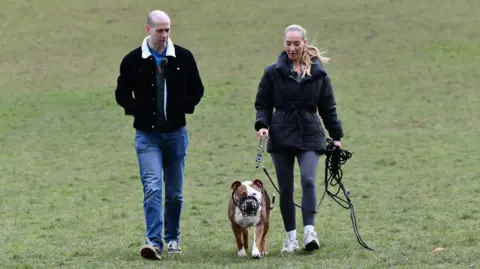
Back in Redditch, having met Lily and learnt more about how she's trained her pet, Matt has decided he's happy to meet Doug and give him a pat.
The experience of meeting Lily and Doug appears to have had an impact. When Matt first emailed BBC News he said: "I used to be very pro-dog but now am ultra cautious and cynical about dog owners. I hate seeing dogs off lead and owners excusing it."
Now, he tells Lily: "Because we've chatted it and I've heard how you are so passionate about caring for him, that makes me feel a lot more comfortable… I'm happy to give it a go."
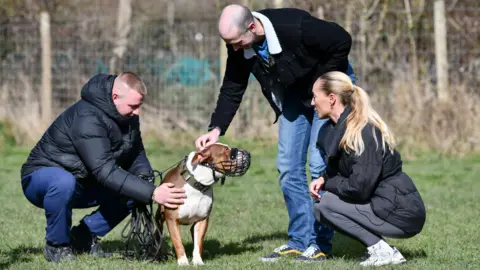
The last time he was this close to a dog, Matt says he was lying on top of it trying to stop it attacking Lydia. It brings back memories of the day of the attack. "I remember how sleek the coat is," he says as he pats Doug.
"Hearing what happened to your daughter it really makes me sad," Lily adds. "It makes me sad too," Matt replies.
Additional reporting by Emily Doughty and photos by Emma Lynch & Simon Hadley
